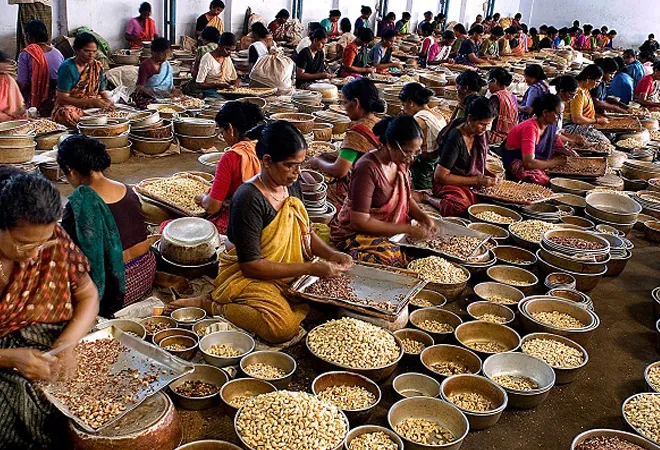
There persists a growing interest in South Asia to better contextualise their labour force within the global economic framework. Successive studies have shown that subcontracting labour in the global south is more complex than it appears and needs to be analysed from diverse perspectives for better policy outcomes. There is simultaneous growth in the subcontracted sector with respect to the relationship between the changing economic conditions and flexibilisation of work and lastly, to make connections between the lives of women on the ground and the changes in national and international conditions.
The Kollam district in Kerala, also known as the “cashew capital of the world”, was a shining example of export oriented growth in India. Approximately 800,000 tonnes of raw cashew would be imported, majorly from African countries and processed by the predominantly large subcontracted women labour force in the cashew factories in Kollam. The city was expected to show an unprecedented growth in processed cashew production for international exports and domestic consumption as well. Efforts were also taken at the diplomatic level to initiate the removal of middlemen in order to increase the profits on both ends, that is, of the African cashew farmers and the cashew processing units in Kerala.
The inception of the cashew crisis in the south Kerala region started in 2016 when the Union Government imposed an import duty of 9.36% on raw cashew nuts. This raised the prices of cashew imports significantly while there was no apparent increase in the price of processed cashews, putting this industry at a major economic risk. The Kerala Government’s decision to hike wages of the cashew workers along with the increasing competition with mechanically produced cheaper varieties of Vietnamese processed cashew put almost 700 Kollam cashew factories in danger, which provided the livelihoods of almost 2.5 lakh skilled women workers (compared to approximately 50 thousand male workers associated with this industry) hailing from marginal communities in rural Kerala. Although recently in 2018, Union Finance Minister Arun Jaitley had called for a further rollback of duty on the raw cashews by 2.5%, many in the business believe that such a measure will be insufficient in reviving the damage already caused to this once booming industry.
A bird’s eye view of the Kollam crisis would seem to be a pure economic crisis that would have impacted a homogenous group of labourers the same way as it did to the vast majority of women working in this industry. But a deeper look at the fallout indicates the basis of gender discrimination on the lines of as to why a significantly larger proportion of women are inducted in the subcontracted sector in the first place giving rise to serious questions of how women are more adversely affected than men due to an external economic stimulus that troubles the subcontracted labour intensive industries. According to an article in The Hindu on 28 April, 2018, a 58-year-old female cashew worker Shanta says, “I don’t know what a computer is and I have never attended a school. I am not good with numbers, and people don’t want maids with ugly burn marks on their hands,” illustrating how it is not easy for them to migrate to another job.
The changing character of capitalist production has led to the flexibilisation of work and technology improvements which in turn make decentralisation of work commercially viable and efficient. Scholars like Amartya Sen and Lourdes Beneria had argued that capitalism affected women and men differently and therefore the option of simple gender mainstreaming and integration are incomplete. Research on Gender and Development had further changed into a vision called DAWN (Development Alternatives for Women for a New Era) that not only questioned the nature of development and domination of developing countries by rich economies but also argued that the development policies must be conceived, revised and evaluated from the perspective of poor women in the Third World, since this group of women is the largest and the most vulnerable in the world, as established by the Kollam crisis.
Women, in order to incorporate their reproductive and other domestic roles coupled with their backward socioeconomic status, often accept unstable and vulnerable work, leading to greater insecurity, health hazards, reduction in wages, lack of pension or other similar government benefits and some of these are strikingly evident amongst the women cashew workers in Kollam. An article in the Business Standard on 5 May, 2018, quotes Sudharma, a former woman labourer in one of the cashew factories: “I used to get about Rs. 3,000 each month. I am simply sitting now. We hope the company will reopen. Owners said they were in crisis due to the increase in wages directed by the Kerala government. We are ready to work on lower wages." These are the main reasons why the plight of subcontracted workers needs to be reviewed through gender perceptions, especially in production and export oriented South Asian countries such as India. The effect of subcontracted work on women’s rights as workers, the impact it exerts on gender dynamics in the household and workplace, and how this kind of paid work affects the double burden they have in caring for their families and earning wages are of critical importance in this age of globalisation.
Gender integration in the development agenda is problematic due to their focus on short term programmes for women which are characterised by more attention on toning down the negative effects of male unemployment rather than promoting women’s long term interests. This has been the trend in not only in the programmes of the World Bank and other international organisations, but also is well evident in the women employment schemes by the Central and State Governments in India. The other problems associated with such a gender accommodated framework has been that of gender mainstreaming where feminist processes of social transformation have turned into technical processes creating wide gaps in the implementation and practice making real inclusion quite problematic.
The way forward is, however, a long journey that involves treatment of women and men as non-homogeneous categories considering the race, class and other factors of intersectionality. Such a method of policy construction is of immense importance for Third World countries such as India so as to envision development convergence with the advanced nations in terms of democracy, human rights, society and economy.
The views expressed above belong to the author(s). ORF research and analyses now available on Telegram! Click here to access our curated content — blogs, longforms and interviews.




 PREV
PREV


